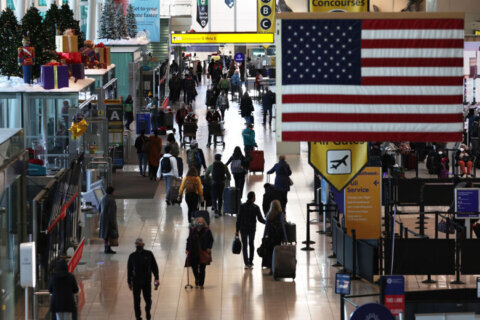Two months after Baltimore’s Key Bridge collapsed into the Patapsco River, the container ship that struck it has been refloated. The Dali has been moved and more work is underway, but does that mean smooth sailing from here on out?
WTOP’s Sandy Kozel and Nick Iannelli spoke to Maryland Attorney General Anthony Brown about the potential legal impacts of the collapse.
Listen to the full interview or read the transcript below.
Nick Iannelli: There are lots of legal cases ahead. The Dali’s owner and operator has filed paperwork to try and limit the amount of liability it would have to pay out in legal cases. Baltimore City filed a suit against the ship’s owner, claiming negligence. With us live to talk about it is the state’s attorney general, Maryland Attorney General Anthony Brown. Sir, thank you so much for coming on with us this afternoon.
Anthony Brown: Good afternoon. Thanks for having me.
Nick Iannelli: So, let’s start off by talking about the magnitude of damages that Maryland can try to collect from what happened on March 26. Do we know anything about that yet, or is it still too early?
Anthony Brown: It’s really still too early. I mean, a lot of numbers are being floated around what the replacement costs would be for the Key Bridge. Certainly that will be part of a claim that we make. There’s damages to Maryland’s natural resources, environmental damages. There’s the potential of loss, economic damages, lost revenues to the state. So, really, it’s too early to quantify. And it’s also too early to say who the responsible parties are. You can imagine that we’re focused on the ship owner, the ship operator, there’s potentially different systems that may have failed. So, we will be looking at the manufacturers, the installers, the maintainers of that equipment. It’s way too early to tell. That’s the process that we’re in right now with our outside counsel that’s providing support.
Sandy Kozel: And with so many different angles that you’ve mentioned, is that why you’re going to be hiring five firms to do all this work?
Anthony Brown: Yeah, and it’s really one consortium. And what we did a few weeks ago, we put out an RFP — request for proposals. We had more than 30 groups, consortiums, submit bids, a total of 63 firms. That’s the interest that people have in assisting the state. So, we chose one joint venture or consortium made up of five law firms. And they all bring unique and important, specific skills and experience to make sure that we really are advancing and promoting the interests of Marylanders.
Nick Iannelli: Over the course of this tragedy, so many individuals and businesses have been impacted. Some were out of work for several weeks. We’re wondering if perhaps there might be a class action lawsuit. Would there be something like that, you think?
Anthony Brown: You know, I can’t speak to the claims that private parties, whether individuals or businesses, may bring. I can say that there is likely to be economic damages, claims that the state of Maryland, that we will bring. Of course, you can imagine lost tax revenues. So, we’ll be looking at those claims, but I’m really not in a position to speak to what claims private parties might bring against either the owners or the Dali or anyone that a private party might believe contributed to their harms or damages.
Get breaking news and daily headlines delivered to your email inbox by signing up here.
© 2024 WTOP. All Rights Reserved. This website is not intended for users located within the European Economic Area.







